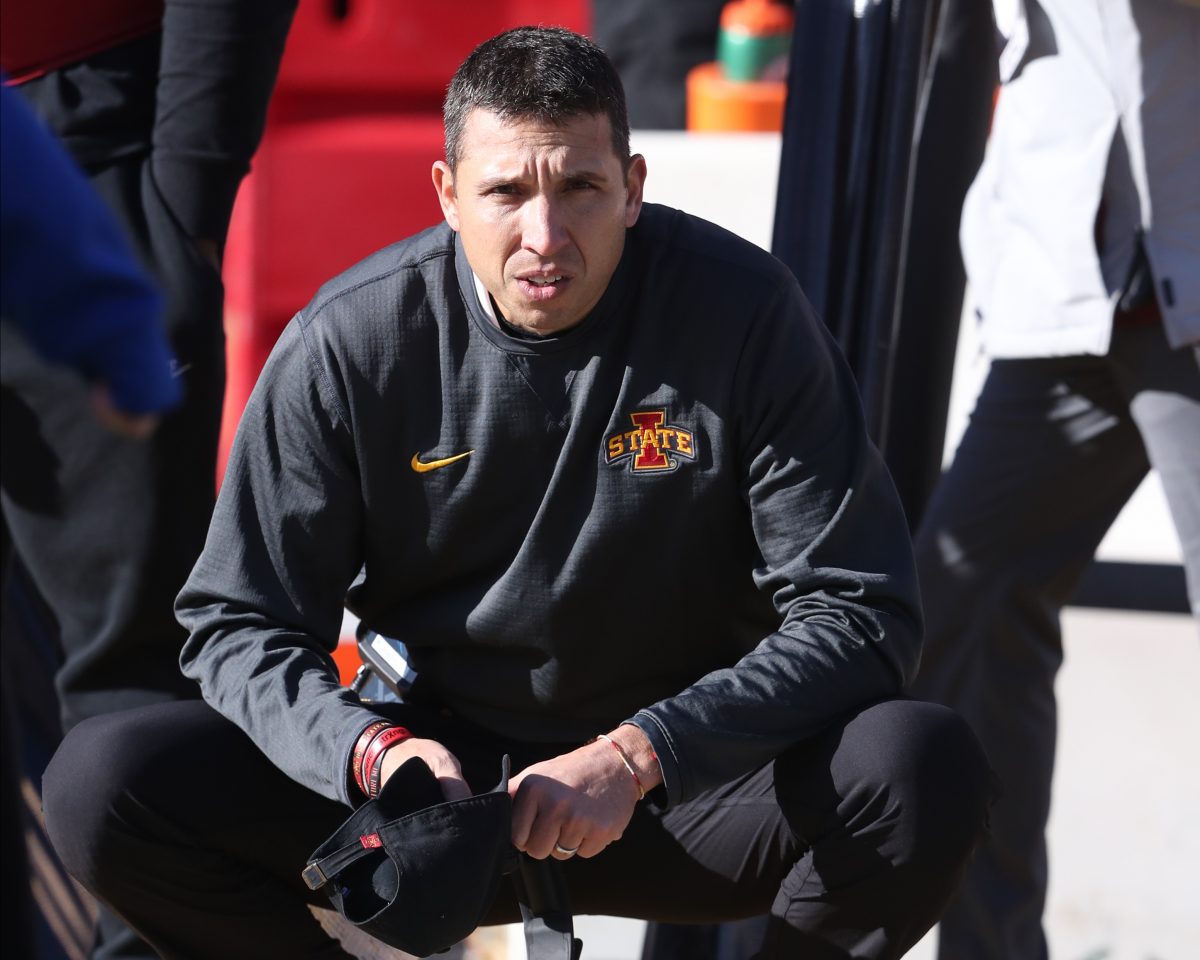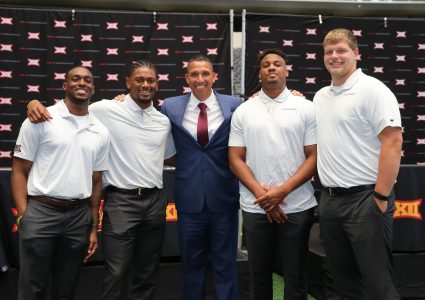Nov 23, 2019; Ames, IA, USA; Iowa State Cyclones head coach Matt Campbell watches his team play the Kansas Jayhawks at Jack Trice Stadium. Mandatory Credit: Reese Strickland-USA TODAY Sports
It’s time to empty the notebook from my one-on-one interview conducted earlier this month with Iowa State football coach Matt Campbell.
Previously, I wrote about how the Camping World Bowl loss to Notre Dame points the path forward in 2020. We also looked back on an up-and-down 2019 season which featured “the champion’s heart,” but not always “the champion’s details.” We discussed how ISU’s already elite tight ends room must continue to grow here — and, finally, in Part IV, Campbell provided more details for why he believes new strength and conditioning coach Dave Andrews and his staff bring true “alignment” to the program.
What remains from our conversation doesn’t necessarily allow for the establishment of a narrative arc, or full focus on one topic, so I decided to showcase Campbell’s other enlightening quotes below, in Q&A format. I hope you enjoy it.
Q: Obviously former recruiting coordinator and tight ends coach Alex Golesh — who left to become a co-offensive coordinator at UCF — deserves a lot of credit for growth in both areas in the program. How well-positioned do you think you and your remaining staff are to continue to make strides in recruiting and at tight end?
A: “Alex knew a little bit of the lay of the land when we initially came in here. I think the reality of where college football has gone and I think where our evolution, even after the first year here — there really isn’t a true recruiting coordinator anymore in terms of an on-the-field coach. In the Power Five level of recruiting, that’s really non-existent. And with us, we were really fortunate because we hired Derek Hoodjer into this role of, essentially he’s the recruiting coordinator. So I think the thing that’s been really big for us is, yes, Alex had value early on of being able to help us for what we wanted to be at this level in terms of our recruiting department. But I think the reality of Alex’s individual fingerprint on the last three recruiting processes really wasn’t anything other than what every other assistant coach is — and that’s a responsibility for a recruiting area and certainly for recruiting their position group.
“Obviously very appreciative of what Alex did here. But the success of our recruiting, I think a lot more of our credit — identifying how we recruit, what we recruit to — really goes to our recruiting department. I think when you really peel back, that recruiting department has been exceptional over the last three years and a lot of credit needs to go to that group and they’ve done a great job.”
Q: Recruiting has always been an all-hands-on-deck job, but has it become more that way in recent years? As in, no one person shoulders most of the responsibility but it’s more broadly shared across the board?
“I think that’s one of the great things about our staff, the ten position coaches, that is so critical to your success — that their ego isn’t so big that they have to feel like I have to go sign five, six, seven players to make my worth to the program be exceptional. I think that’s where us having continuity and great trust in each other that we know what fits here, we know what fits in terms of the expectation of a player in our football program — and not just in terms of the skill, but the quality and the character. We know our program’s going to be hard. We know it will be tough. We know that we’re going to ask a lot of our guys and who can actually develop when they come into our program is probably as much of a question that I’ll ask and that I love to get into when we recruit a young man than what’s their overall talent. Because unless they can develop, they’ll never maximize their full potential.”
Q: How often, when evaluating the culture of your program, do you go back to when you were an incoming freshman at Pitt, didn’t like what you saw, and decided to go the D-III route at Mount Union, where you found everything you were looking for?
A: “Well, it’s so funny you say that because I think there were even moments this year where you said, ‘Man, if I was that player in this program right now, what would I feel? What would I feel like?’ And I think that always continues to resonate — (it’s) what I love about my job, actually, is my job is literally to — these are 18 to 22-year-olds that are in the prime of their life and this experience is going to have a direct result and outcome to the next 40 to 50 years of their life. And if we’re just serving them in football, then we’re really failing them. I think sometimes in the season, even in this past year, where obviously you’ve got a group of kids that wanted to be as good as bad as anybody I’ve ever wanted to be around. You’ve got a group of coaches that want to be as good as bad and you’ve got a head coach that wants to be as good as anybody. But, also with that comes everybody’s got the same mentality: Work harder. And, you know, sometimes as you work harder, the very essence of what I love about my job — the relationships, the love, the care, to serve the culture piece of it, sometimes you can get so laser-focused on the end result, or the game, that you lose perspective, really, of what’s built you to get where you’re at.
“It’s funny you say that but I think that has been — the ability to have enough humility to go back and put yourself in those young men’s seats and sit inside your walls every day and what’s their experience and how are we giving them every experience to be the best version of themselves they can be, I think it really helps you make the best decisions for the betterment of the program consistently. And sometimes those are hard decisions that you have to make, but I think when you always put it back in the betterment of the young men in your program, I think it helps you be able to make a really good decision.”
Q: You recommended Ryan Holiday’s latest book, “Stillness is the Key,” which I loved. What resonated most with you? How did it help you as the 2019 season wound down?
A: “You know, it’s funny because that book came to me towards the end of the football season as craziness was hitting in every aspect of life. I think it was such a timely read from my end that just the ability to have the perspective of what was going on around you and having enough humility to not make knee-jerk reactions and the ability to really evaluate your surroundings was a powerful, powerful book and a powerful time for me. I think it’s one of those things that the lessons learned in there are phenomenal and really, I think, held true for how, even as I was able to handle our own football team through some really tough, choppy waters and then try to handle our football program through some really tough decisions as the season came to an end. Trying to really help make the right decisions for the right people in the right moments was really critical.”
Q: Two examples from the book struck me the most: Shawn Green, the former baseball star and Michael Jordan, one of the greatest basketball players of all time. They both personified the positive effects of “stillness” in diametrically-opposed ways, but that’s OK. I’d imagine seeing how different mindsets deal with “choppy waters” was valuable to you as well?
A: “That’s it. You’re looking at that from my perspective of how do you deal with your players? How do you deal with your staff? How do you deal with the culture? And I think you saw all examples of that occur on our own football team. The success of some players at a young age and the wear and tear of the emotion of trying to be the best all the time and almost, at times, handcuffing themselves mentally because of what’s going on to the same thing with our coaching staff. If it’s always negative, do you always become the best version of yourself you can be? No. So it is — it’s fascinating. The book’s fascinating and like you said, it came at a great time for me, probably at one of the most powerful times that I needed in my career.”
Q: You know me, I’m the guy who really cares what books you curate to give to the whole team in the spring and the fall. Any thoughts on the spring book yet?
A: “No, not yet. I think that’ll be a process here for the next couple months, but I’m plowing through books as we speak for myself and the team in mind, of course. But, yeah, that’s a process that will kind of take you through the early spring.”





